hello.
as someone who speaks about literature frequently on substack, tiktok and the other apps, i have been thinking a lot about how easy it is to let social media shape our reading lives without even realizing it. sometimes the books we add to our lists are not our choices at all. they are reactions to trends, algorithms, and other people's tastes. not in an obvious way, but in the way a title ends up on your tbr just because you’ve seen it enough times. the way a cover starts to look familiar. the way someone else’s excitement makes you feel like maybe you should read it too. and before you know it, your reading list starts to feel less like a reflection of your own curiosity and more like a reaction to whatever is loudest.
reading doesn’t have to (and shouldn’t) be reactive. it doesn’t have to move at the speed of the feed. there’s a real kind of magic in stepping outside of the algorithm and finding your way back to the books that you are drawn to. the ones you wouldn’t have found unless you were paying closer attention. building a tbr that feels disconnected from trends can feel like remembering how to listen to yourself again.
here are some ways to find your next read. ways that feel slower, more deliberate, and a lot more personal.
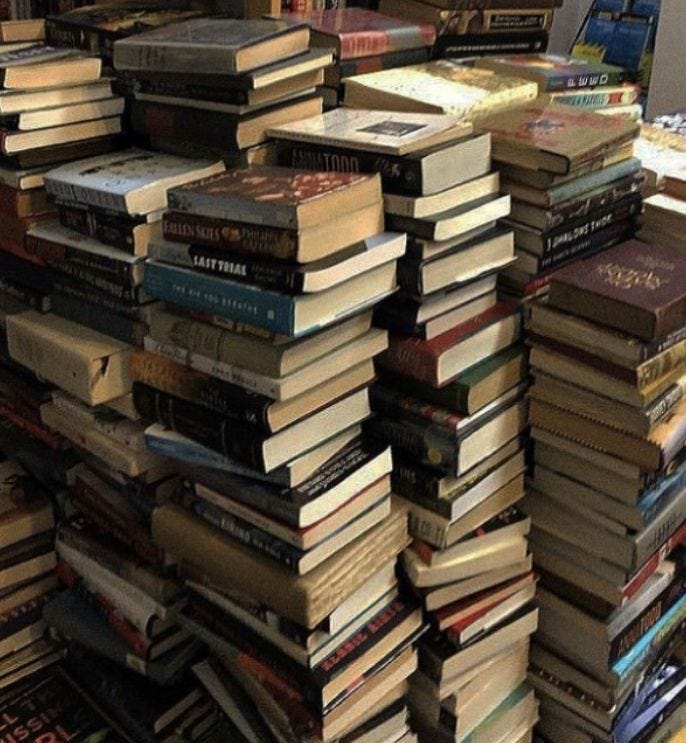
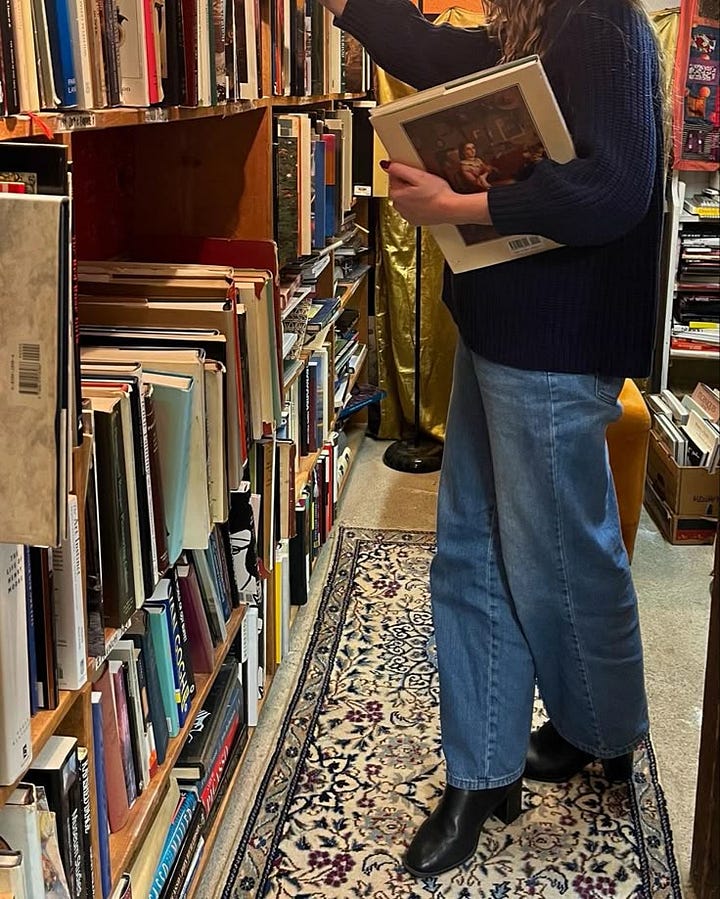
notes on finding your next read…
-local bookstore
what’s your favorite bookstore? go there. not with a list, not with a trending title in mind, but with nothing but time and a willingness to be surprised. wander the aisles. pick up books you’ve never heard of. read the first lines. linger. this is one of the last sacred spaces where you can still discover things slowly, with your hands and eyes instead of a screen. and don’t be afraid to talk to the booksellers. they’re curators. ask them what they’ve been reading lately and tell them what you love, what you can’t stand, what kind of mood you’re in. and if their rec doesn’t hit? ask someone else. every bookstore has its cast of characters, each with their own niche obsessions and literary fixations. there’s always someone who lives for experimental fiction, someone who cries over family sagas, someone who reads nothing but obscure poetry in translation. finding your person, the bookseller who gets your taste, is like unlocking a secret door. once you do, every trip becomes a miniature pilgrimage and a conversation and a new chapter.
-your favorite authors favorite authors
this is one of the richest and most overlooked paths to finding books that will gut you in the most beautiful way. think about your top five favorite authors and ask: who did they love? who shaped their voice, their worldview, their obsessions? many writers speak openly about their literary influences in interviews, essays, and letters. sometimes it's a passing mention—other times, it's an entire annotated reading list. dig for those. google “[author’s name] favorite books.” look for old paris review interviews. scan their personal essays for the names they drop. you’ll start to notice patterns. recurrences. little literary bloodlines. you might learn that clarice lispector swore by dostoevsky. that ocean vuong reads rilke religiously. that zadie smith is obsessed with nabokov. it becomes a kind of spiritual lineage and a trail of breadcrumbs through the literary forest. the books you find this way often feel intimate, like private inheritances. like you’re being handed something sacred passed down quietly from writer to writer to you.
-your favorite literary publications: the paris review, lit hub, the new york review of books, etc.
there is a gold mine tucked away in the digital archives of these literary publications. not just in the latest features, but in the old interviews, staff reading lists, and forgotten essays from decades past. scroll through the paris review’s art of fiction series and you’ll find writers casually mentioning the obscure russian novel that changed their lives. dig into lit hub’s quieter corners and stumble on personal essays that name drop out of print books you’ve never heard of. the best part is that none of it is designed to go viral. it isn’t about aesthetics or book hauls. it’s about literature as a lifelong conversation. these are places where serious readers talk about the books that shaped them, not the ones trending for five minutes. spend time in those ecosystems and you’ll begin to build a reading life that feels both private and expansive, like you’re joining a secret club that doesn’t care about followers, just sentences that changed someone’s life.
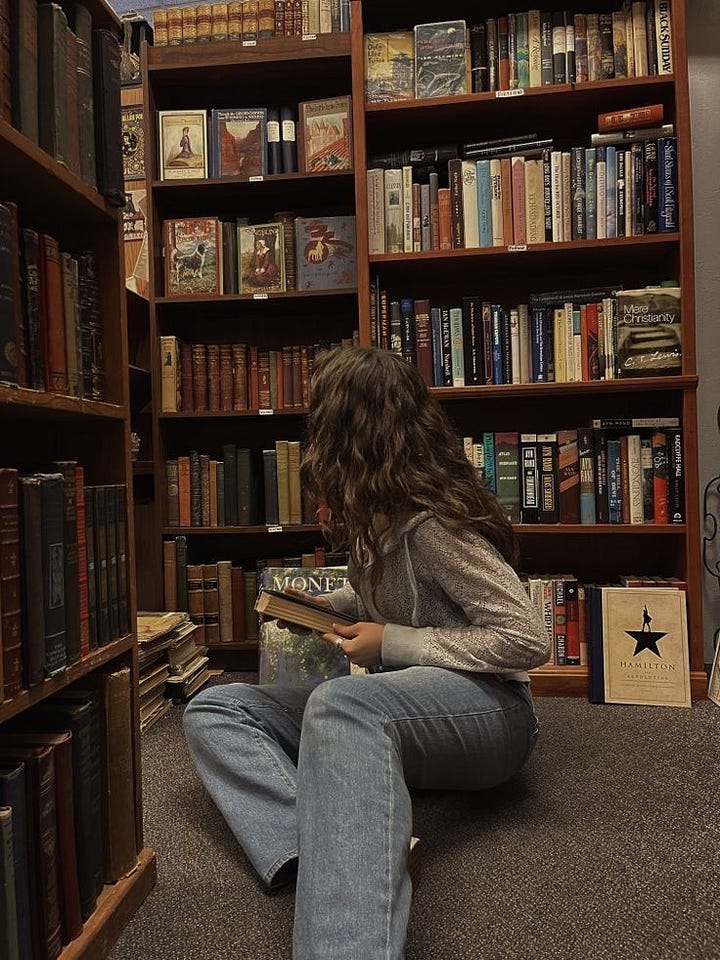

(this post is free, but if you enjoy this newsletter, consider becoming a paid subscriber and be part of a smaller circle where things feel a little softer, a little more personal, you’ll get early access to my youtube videos and a weekly media consumption roundup filled with articles, video essays, podcasts, and other references to make you smarter. i’d love to have you there.)
-staff picks at your favorite bookstore
this is a cousin to the first tip, but it deserves its own spotlight. the staff picks shelf is one of the most overlooked treasures in any bookstore, not because it’s hidden, but because we’re often too busy chasing what's new or buzzy. these are not algorithmically generated suggestions. they’re not based on sales data or marketing trends. they’re chosen by real people who read deeply and care a lot. often, they’re the books that changed someone’s life a little… enough to make them write a handwritten note and stick it on the shelf for strangers. some picks will be personal obsessions. others will be wildcards. many will be older titles you’ve never heard of, or genres you thought you didn’t like, but are now seeing through someone else’s eyes. what you’re reading, when you read from the staff picks shelf, is not just a book, it’s someone’s favorite book. and that kind of quiet, human endorsement is always worth listening to.
-goodreads
goodreads can feel like a mess if you treat it like another form of social media, full of numbers, stars, and opinions you didn’t ask for. but used with intention, it becomes a surprisingly powerful tool for literary discovery. look up a book you loved, not just to reread the blurb or reviews, but to scroll down and find what else readers who really loved that book are reading. don’t just stop at the big names, go into the obscure lists, the niche tags, the overlooked read alikes. search “books for when you feel lost” or “quiet novels with emotional damage” or “gothic coming-of-age stories.” follow the hyperlinks like rabbit holes. some of the best finds come from following vibe, not genre. treat it like a digital maze, and trust your instincts on what to click next.
-your library
your local library is one of the last places that still believes in slow time. go there with no plan. let yourself browse the way you did as a kid, by color, by title, by a weird cover that grabs your attention. pull down anything that makes your heart pause. let your hands decide. most libraries have pockets of hidden curation, shelves for translated fiction, overlooked authors, or staff favorites that aren’t advertised like they would be in a store. and don’t underestimate librarians. they are some of the most insightful, passionate readers alive. strike up a conversation, and they’ll likely recommend a book you’ve never heard of that ends up altering the way you think. the library is also a place where risk costs nothing. if a book doesn’t resonate, return it. the entire space invites experimentation, discovery, and slowness. it's not just a place to find books, it’s a place to find yourself as a reader again.
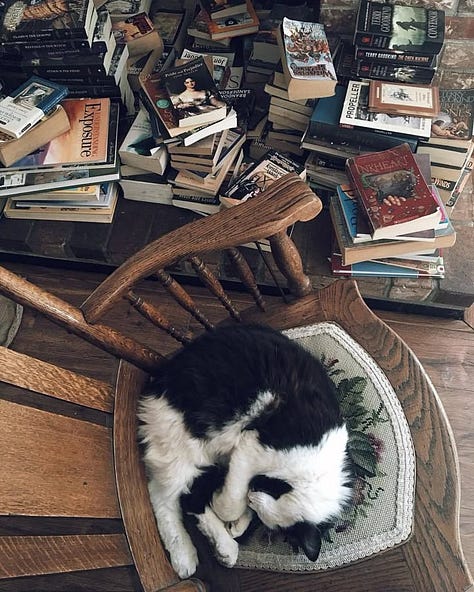
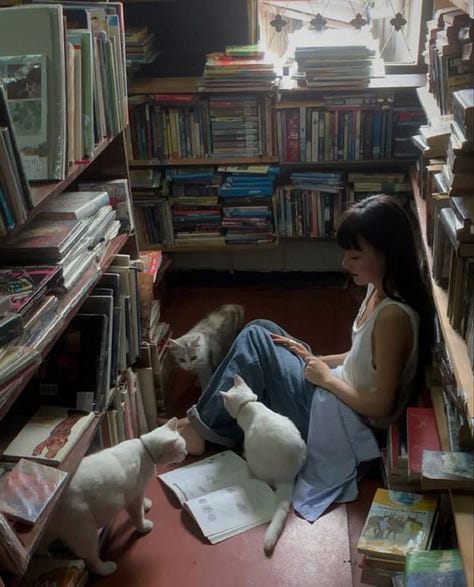

-publisher backlists
every time we obsess over new releases, we forget that publishers have decades, sometimes centuries, of brilliant books sitting quietly in their backlists. this is especially true for small presses and literary imprints, which often publish the most singular, daring, emotionally rich work you’ll ever read. books that didn’t go viral but still whisper to the right reader. start by identifying the imprints you trust: nyrb classics, fitzcarraldo, archipelago, graywolf, new directions, europa editions, dorothy, a publishing project. go to their websites and just scroll. forget about publication year. read the synopses. look at the covers. you'll start to notice themes and voices that draw you in. the magic of the backlist is that you’re not chasing hype, you’re excavating. and what you find will often feel like it was waiting for you, not the other way around.
-translated literature
if your reading life starts to feel predictable, one of the best ways to shake it up is by reaching for translated work. stepping into another language can completely reset your sense of what a story can be. there’s something deeply refreshing about seeing the world through a different cultural lens, especially when it comes to rhythm, structure, or even emotional tone. some of the most unforgettable books i've ever read weren’t written in english, they carried a kind of strangeness that made them feel more alive. publishers like archipelago, europa editions, new directions, and fitzcarraldo are great places to start. read across borders. it’s one of the easiest ways to feel wonder again.
-friends who get it
not all friends are created equal when it comes to book recommendations. some will send you whatever’s trending. others will suggest what they love, without thinking about whether it fits you. but then there are the rare ones… the friends who just get you. the ones who know the exact kind of emotional unraveling you’re drawn to. these are the people to trust. ask them what they’ve been reading lately and what they finished and immediately needed to talk about. these conversations can lead to the kind of book discoveries that feel like fate, because when a recommendation comes from someone who knows your interior world, it’s not just a suggestion, it’s a gift. a little mirror and breadcrumb toward something you didn’t even know you needed.
-reading prize shortlists
literary prizes aren’t just about winners, they’re about the entire ecosystem of books deemed exceptional that year. the shortlist is often where the real magic happens. these are books that might not have taken the top prize but were still powerful enough to make it to the final round. start by digging through old shortlists for prizes like the booker, the national book award, the international booker, the pulitzer, the dublin literary award, the strega, the giller, or the women’s prize for fiction. don’t stop at the past year, go back a decade. what you’ll find is a trail of deeply thoughtful, often genre defying books that were loved by serious readers and judges, even if they didn’t get the final spotlight. it’s also a great way to diversify your reading, these lists often spotlight international voices, experimental formats, and authors you’ve never heard of. and there’s something thrilling about reading a book that was almost crowned the best. sometimes those are the ones that end up mattering more.


-following a theme instead of a title
sometimes the best way to choose your next book isn’t by title or author, but by feeling. what’s been echoing through your life lately? loneliness? desire? longing for escape? instead of searching for a specific recommendation, start with a theme. maybe you’re looking for books about solitude, or artists, or books about mothers and daughters, about reinvention, about grief, or obsession. google it, search it on goodreads or tumblr or ask the bookseller at your favorite store. this kind of intuitive reading path often leads to the most personal discoveries. because you’re not looking for a popular book, you’re looking for a book that understands you right now. one that can meet you where you are. reading this way feels less like consuming and more like communing. like you’re entering into a private conversation with someone who’s felt what you’re feeling, and found a way to say it beautifully.
at the end of the day, the books you find slowly by wandering, listening, and following invisible threads, are often the ones that stay with you the longest. they settle deeper and feel less like something you consumed and more like something you stumbled across at exactly the right moment. they weave themselves into the fabric of your life in a way no algorithm ever could. these are the books you return to without realizing it. the ones whose sentences echo in your mind years later, long after you have forgotten when or why you first picked them up. they become part of you, quietly and permanently, the way only something truly chosen ever can.

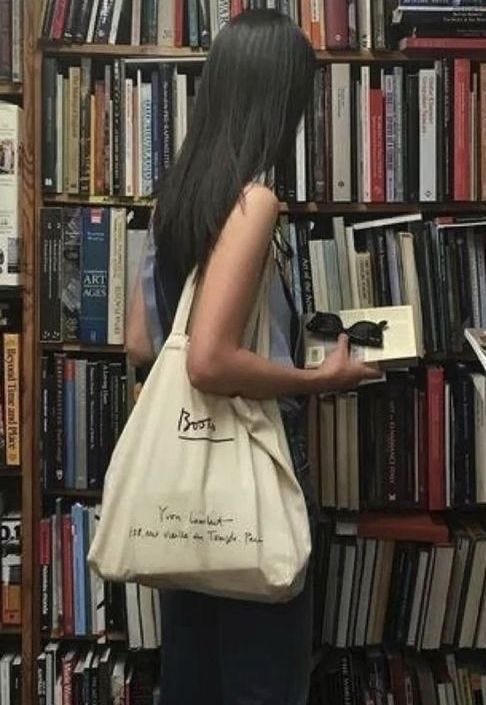
okay, that’s all for today.
if you’re not ready to become a paid subscriber and you have the capacity to leave a tip, that would be so appreciated.
i love you.
bye.
(follow ig, tiktok, youtube, pinterest and spotify for more)


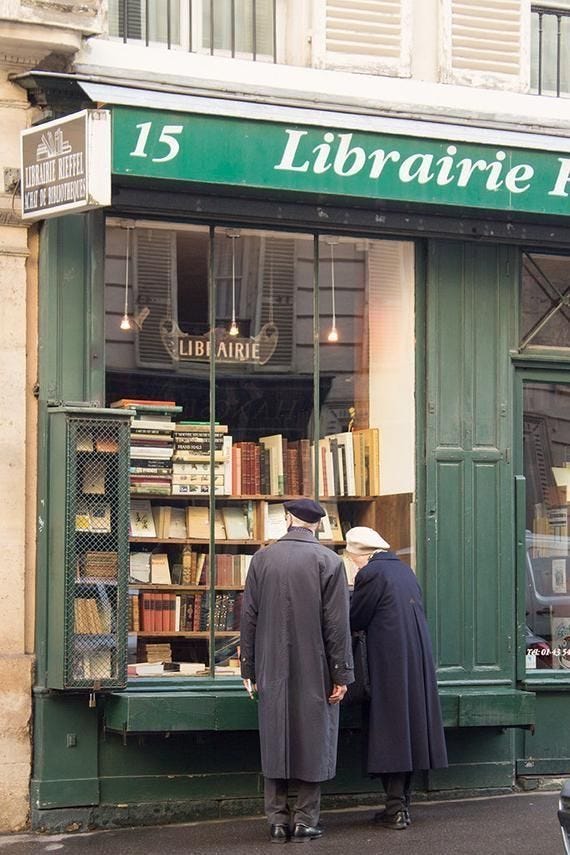
Wonderful tips!!
Also a little something if good reads isn’t your thing (Amazon owned and all that) I’d recommend checking out StoryGraph, it was created by Nadia Odunayo so it is black and female owned. It used to have some glitches but now it’s working wonderfully for me (I also believe you can transfer history from good reads onto story graph if losing all of your history in there is a concern).
I found this when I needed it the most.......and this isn't the first time that you have delivered something I really needed advice on.......it's lovely to see how you know what your readers want.....